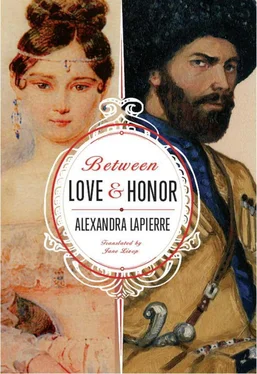PRINCESS ORBELIANI
AND PRINCESS CHAVCHAVADZE
After eight months in captivity, the princesses were in a physically and psychologically fragile state, obliging them to return home across the Caucasus at a slow pace. Anna felt guilty about the death of the infant who had slipped from her arms during the wild cavalcade as they were being abducted. Of all the hostages, she suffered the most, taking ill while captive and losing her sumptuous tresses. She recovered from the ordeal with great difficulty. The two sisters then left for Moscow and Saint Petersburg to thank the Romanovs for having made their liberation possible by consenting to the return of Jamal Eddin. They spent nearly a week at the cottage of Peterhof-Alexandria, where the dowager empress gave a “country ball” for them, an event that belonged to other, happier times. The ransom payment had so depleted the Chavchavadze fortune that Czar Alexander II assumed the cost of rebuilding and restoring Sinandali. The family was granted use of the domain, which then became the property of Russia upon the death of Prince David. The manor is still there, in its tropical garden above the river.
Princess Varenka remarried late in life and died in 1884. George was her only child. Princess Anna died twenty years later, surrounded by her many children and grandchildren. They portrayed the imam Shamil as a great head of state. Their accounts and that of the French governess abducted with them—the first descriptions of the man from eyewitnesses—considerably changed public perception of the man’s personality and moral character. They described him as a pious, loyal, and noble man of integrity, fighting for the independence of his people. The princesses’ admiration and respect brought the imam renown and immense popularity in Russia and throughout Europe.
In France, the Journal de Toulouse even published a strange obituary notice, slipped in before the agricultural news, on October 19, 1858. The journal regretted to announce to its readers the death of “Djemmal-Eddin, son of Shamil,” in Soul-Kadi, in the Caucasus, the result of an illness his doctor attributed to depression.
THE IMAM SHAMIL
In August 1859, scarcely a year after Jamal Eddin’s death, the young man’s prophecy came true.
Betrayed by his naïbs, abandoned by his people, robbed by the villagers, attacked on all fronts by the Russians, Shamil was forced to lay down his arms. He was beaten. Yunus, Mohammed Ghazi, and four hundred warriors followed him into his ultimate battle, fighting for their honor and the greater glory of God. All of them knew that their war against the invader was over. Shamil hoped only to die as a man of arms, in the village of Gunib that he was defending for the last time. However, he finally accepted the humiliation of giving himself up alive in order to spare his family, his wives and children. General Dmitri Alexeyevitch Milyutin, then aide-de-camp to Prince Bariatinsky, was present for his surrender. Shamil, Yunus, and the fifty surviving murids were certain that the infidels would execute them and send their sons into bondage. They were mistaken.
Exiled to Russia with Mohammed Ghazi, Shamil was treated with all the honor due a great warrior. The journey to the north that both expected to be a long trip to the scaffold turned out to be a triumphal tour. Shamil was welcomed as a hero in every city that crossed his path. Huge crowds greeted him and covered him with garlands of flowers. Parties were given in his honor, and everyone wanted to meet him. He was received by Czar Alexander II, later to be known as “Alexander the Liberator,” who embraced him and called him his friend. Together they watched the Russian troops pass in review. At first wary, then surprised, and finally quite overwhelmed by such a welcome, Shamil observed the world around him. He remembered all that his son Jamal Eddin had told him, everything that he had refused to believe. The memory of his twice-sacrificed son was with him constantly. He walked in the footsteps of Jamal Eddin, meeting those who had loved him and visiting the places where he had lived. His third son, Mohammed Sheffi, his steward, his wives, and their households joined him at Kaluga, a small city south of Moscow. Shamil and his family lived there, under surveillance but widely honored and respected, for nearly ten years. In 1866, Shamil and his sons swore allegiance to the czar and took an oath of loyalty to Russia. The climate in Moscow proved fatal for several in his entourage, and those who remained were allowed to move farther south, to Kiev. Following his oath of loyalty, Shamil became a Russian citizen and was thus permitted to leave Russia to make a pilgrimage to Mecca.
He died in Medina on February 4, 1871, and was buried there according to his final wishes.
A few years after his surrender, the martyrdom of his people began once again in the Caucasus.
Entire populations were massacred, stripped of all their possessions, and deported. A series of crimes, more terrifyingly brutal than ever, followed.
The saga of Shamil was soon claimed by both camps, the Russians as well as the Chechens and Dagestanis.
At the National History Museum in Moscow, a permanent exhibit is devoted to his legend. His portrait and those of his children are on display, and an entire roomful of images tells the story of his exploits.
In Dagestan and in Chechnya, the imam Shamil is still regarded as the incarnation of the union of the Caucasian Muslims and the armed struggle for the triumph of God, the honor of men, and the liberty of the people.
Two of his sons shared this religious, political, and moral inheritance.
One of them, Mohammed Ghazi, never accepted the yoke of Russia and continued to fight for independence. He moved to Constantinople and later fought with the Turks.
The second, Mohammed Sheffi, served in the army of the czar.
The third son, born in captivity at Kaluga, would try to reconcile these two loyalties to Russia and to Dagestan. He named his own son after the legendary brother he never knew, Jamal Eddin.
This second Jamal Eddin Shamil also became a lieutenant in the Russian army. In 1911, Jamal Eddin II, then posted south of Tiflis, also fell in love with a Georgian princess, whom he kidnapped and married. He brought his Christian wife and their little boy to his family’s native village, Ghimri, before disappearing into the maelstrom of the First World War.
But that, as they say, is another story…
adat:law of the elders that governs daily life in the Caucasus
amanat:hostage given as a guarantee of good faith during peace negotiations in the Caucasus
aul:mountain village in the Caucasus
atalik:a sort of tutor who assists the parents in overseeing the education of a male child in the Caucasus
Avar:Caucasian tribe to which Jamal Eddin belonged
Bek:noble title
burka:a black, waterproof cape made of goat hair
cherkeska:Caucasian man’s costume, typically buttoned and belted
Cherkess:Circassian. Also the main nation of the western Caucasus. Sometimes incorrectly used to describe a native of the Caucasus
cornet:lowest rank of officer in the Russian cavalry, equivalent of a second lieutenant
djighit:warrior horseman of the Caucasus
djighitovka:equestrian games of djighits
ghizir:cartridge belt worn across the chest of a cherkeska
giaour:pejorative term referring to infidels
Hakika:the truth
junker:Russian officer candidate, rank immediately inferior to a cornet
Читать дальше












